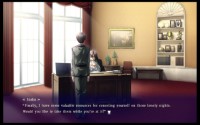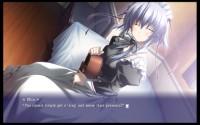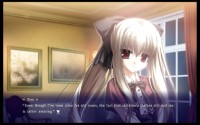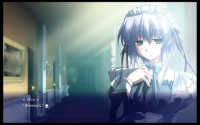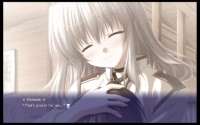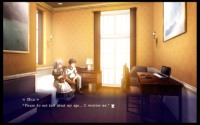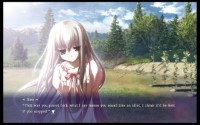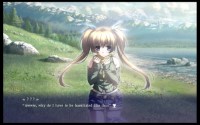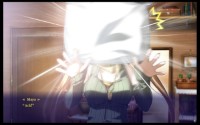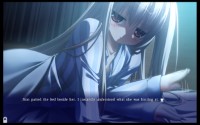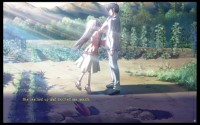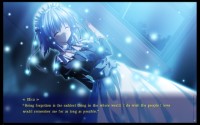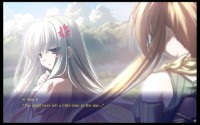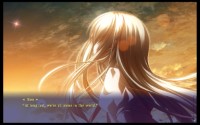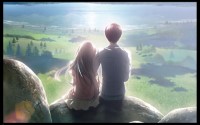eden*
Playtime: 10 Hours
Finished 23 July 2023.Played on Steam Deck; the game worked fine without me touching compatibility (uses Proton by default, I think), but I did rebind the X/Y buttons for easy save/load access. The intro and closing movies didn't play, though all of the animations in the game scenes work fine. Really liked this one - given that it's probably my first of this subgenre, I feel like this story will continue to pop into my head on occasion long into the future.
This is a very short game with a very melancholic central theme, which is a subgenre of VN that I play very infrequently. From the very beginning, it's clear that the game means to induce certain emotions of sorrow, and maybe dread - but I think the way that the story actually pans out is able to subvert that a little bit, even though the entire plot is very predictable. My approach to this game ended up feeling like a reverse of a more typical VN, as I feel the draw of eden* is more about the pursuit of a free & quiet life than it is about the drama along the way. Many of the most impactful moments in this would be considered mundane elsewhere, so this benefited massively from being specifically a VN and not any other medium. A traditional book would struggle to convey the constrast between the bland facility and the beauty of the mountain landscape, a graphic novel couldn't portray the long conversations amid a complete lack of action, and video media like movies or shows would have to abridge too many minor developmental moments in favor of the few big events. The pacing of this VN is glacial, even taking into account its short runtime; but rather than it being a negative, I found myself coming around to appreciating the times where Sion and Haruna were truly settled into a boring yet happy life in the middle of nowhere.
It's worth noting that the game is more or less split precisely into two distinct halves. The second documents their life alone together, but the first brings to light the events that led the two of them there to begin with, taking place within a research facility housing Sion - the person behind the design of the colony ships allowing mankind to flee from an incoming star destined to destroy Earth. Haruna is suddenly transferred to a quiet post there after a career in the special forces for unknown reasons; but as time passes, he begins to realize that it wasn't just by random chance. The base commander is a Colonel Inaba, who was responsible for taking away his sister 7 years prior, and he also meets Lavie, a soldier he met on some battlefield a few years earlier as well. But perhaps more importantly, he also meets Elica, a maid and caretaker of Sion whose interactions with Haruna are able to make a significant shift in his mentality, forcing him to question his reasons for living. While this part of the game did a good job of setting up Haruna's motivations, I thought that there was too much time spent on random vague military explanations that lots of "army-boo" types like to shove in stuff (such as in Muv-Luv). Haruna also starts off with a serious case of high-schooler edgelord syndrome, which probably fits to some degree but does leak a bit of cringe into the writing at times. This personality is so entrenched in his initial character that I felt that his development towards helping Elica in fleeing with Sion was quite sudden... Combined with the relative lack of interaction between Haruna & Sion in favor of more conversations between Haruna & Elica, I felt as if his decision to assist Sion was more from a sense of duty in rectifying his prior mistakes, rather than a genuine desire to see Sion freed from her prison - as if Sion just happened to be a stand-in for his "sister" who was taken away so many years ago.
The second half of the game is an immediate and significant tonal shift from the first as if a vacuum came in and sucked all the life from the world outside of the two, even though there weren't really that many characters or much action to begin with. The early parts of this half focus primarily on Sion settling into the new life, finally experiencing the outdoor air and scenery she had been kept from for 100 years. Sion's complete incompetence towards basic tasks like laundry, gardening, cooking, and other basic survival skills are heavily contrasted against her prodigal abilities in engineering, making her dependent on Haruna due to Elica's absence and serving as a spark for their deepening relationship. Despite this, there is a constant undertone of a dormant sadness in the knowledge that this time is limited, either through Sion's deteriorating health and impending death, or from the star - due now to collide with Earth within the next year or so. Nevertheless, they manage to eke out quite a comfortable and happy life in their small corner of the world. At some point, a journalist, Maya, manages to track them down - interviewing Sion and generally bringing a sense of energy and silliness, but as she leaves before the final colony ship departs, a final, pervasive sense of loneliness creeps back into the game as the plot slowly spirals into the final act. Even as Haruna and Sion finally proclaim their love for one another, Sion's health starts to deteriorate dramatically, making her too weak to do even the simple, basic tasks she enjoyed just months before. Eventually, even staying awake becomes very difficult as she starts to sleep for days at a time - a clear indicator that she is very near death, yet the two of them still share as many moments as they can with one another in the time they have left.
The end of the game is quite heartbreaking, even though it was always inevitable - obvious to any player from the very beginning. Where most other VNs tend to end once love blossoms in an optimistic view of the future, eden* is only able to run to the end of Sion's lifespan, showing the happiness that she was finally able to find right before the end of her journey. Haruna is able to find his reason for living as well; not just for his duty to help Sion escape, nor just for his love of Sion, but eventually the happiness he is able to find in living, even with her gone. That's why I found that the end, while sad, was still hopeful in a way. Haruna still wishes to continue living for a future he can look towards; I noticed that the entire final act hardly even mentioned the star anymore, as if the apocalypse would be inconsequential to Haruna's will to live on; in my mind, Haruna's indomitable spirit gives the game one final, hopeful twist.

